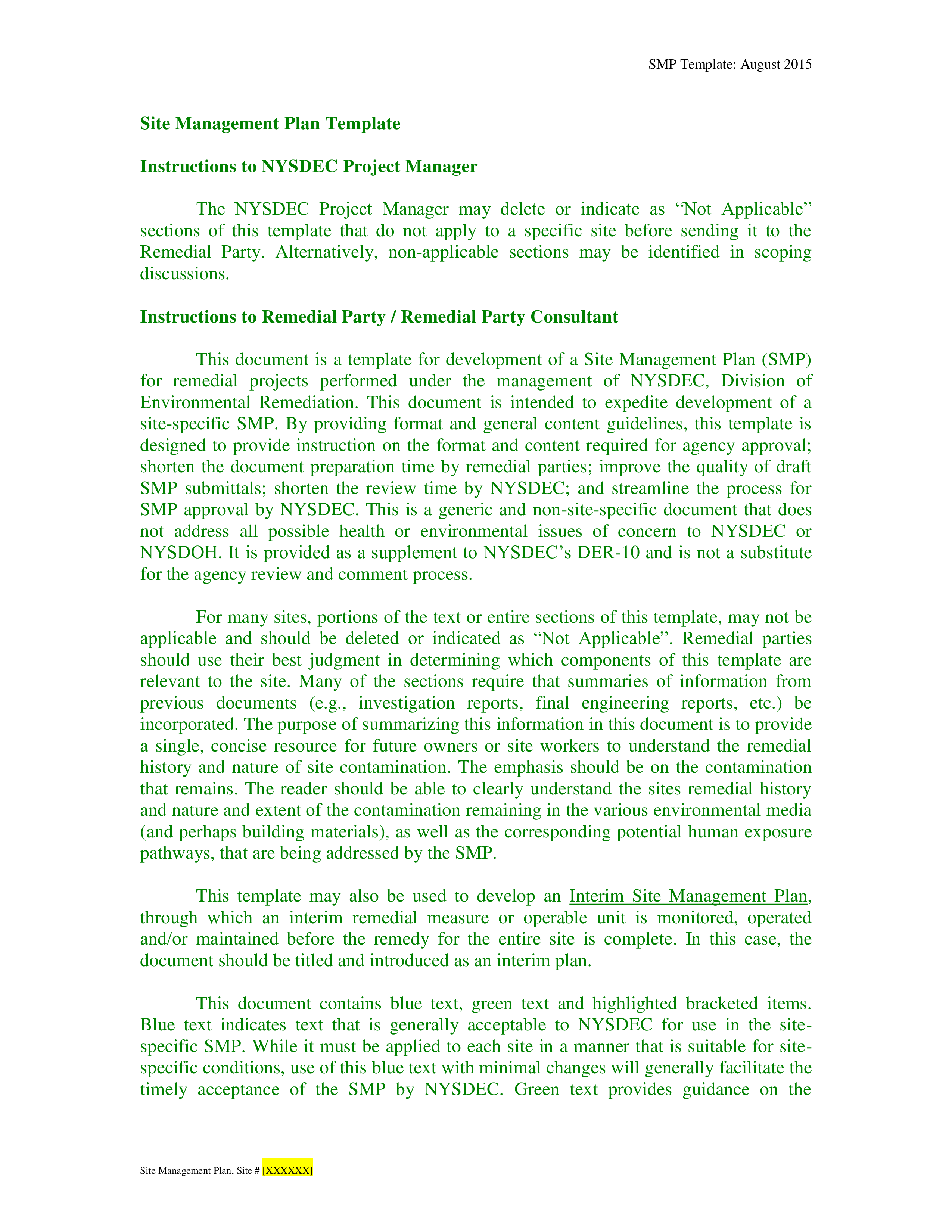Site Management Plan Template
Save, fill-In The Blanks, Print, Done!

Download Site Management Plan Template
Adobe Acrobat (.pdf)- This Document Has Been Certified by a Professional
- 100% customizable
- This is a digital download (686.31 kB)
- Language: English
- We recommend downloading this file onto your computer.
A Site Management Plan (SMP) is a comprehensive document that outlines the strategies, procedures, and responsibilities for managing and overseeing activities at a specific site or location. It is commonly used in various fields, including construction, environmental management, project management, and event planning, to ensure that operations are carried out efficiently, safely, and in compliance with relevant regulations and standards.
The content and details of a Site Management Plan can vary depending on the specific context and purpose of the plan, but it typically includes the following elements:
- Objective and Purpose: Define the main objectives and goals of the site management plan. What is the plan intended to achieve, and what are the desired outcomes?
- Scope: Clearly outline the boundaries and limits of the site to which the plan applies. This helps all stakeholders understand what falls under the plan's jurisdiction.
- Site Description: Provide a detailed description of the site, including its location, size, layout, and any unique characteristics or features that may impact site management.
- Stakeholder Roles and Responsibilities: Identify and define the roles and responsibilities of individuals and parties involved in site management. This may include site managers, contractors, subcontractors, safety officers, environmental officers, and others.
- Site Access and Security: Describe how access to the site will be controlled, including security measures to protect the site and its assets.
- Health and Safety Procedures: Outline the health and safety protocols and procedures to be followed on the site. This includes safety equipment, emergency response plans, and any specific safety requirements for different activities.
- Environmental Management: If applicable, detail environmental protection measures, including waste management, pollution control, and any necessary permits or regulatory compliance.
- Site Layout and Design: Provide site maps and layouts, including the placement of structures, utilities, and other site components.
- Schedule and Timeline: Present a schedule of activities, milestones, and timelines for the site. This helps ensure that work is completed in a timely and organized manner.
- Quality Control and Assurance: Describe procedures for maintaining quality standards and ensuring that work is done according to specifications.
- Communication and Reporting: Explain the communication channels and reporting mechanisms that will be used to keep all stakeholders informed of progress, issues, and changes.
- Risk Assessment and Mitigation: Identify potential risks associated with site activities and propose measures to mitigate these risks.
- Regulatory Compliance: Address how the site will comply with local, state, and federal regulations, including permits and licenses.
- Site Closure and Restoration: If the site is temporary, outline the procedures for site closure and restoration to its original or desired condition.
- Appendices and Attachments: Include any additional documents or reference materials that support the plan, such as maps, permits, or relevant regulations.
A well-developed Site Management Plan is essential for ensuring that a site's operations run smoothly, efficiently, and in compliance with applicable laws and regulations. It serves as a guiding document for project managers, site supervisors, and all stakeholders involved in site management, providing a clear framework for coordination and decision-making.
Download this project Site Management Plan template now!
DISCLAIMER
Nothing on this site shall be considered legal advice and no attorney-client relationship is established.
Leave a Reply. If you have any questions or remarks, feel free to post them below.
Related templates
Latest templates
Latest topics
- GDPR Compliance Templates
What do you need to become GDPR compliant? Are you looking for useful GDPR document templates to make you compliant? All these compliance documents will be available to download instantly... - Google Docs Templates
How to create documents in Google Docs? We provide Google Docs compatible template and these are the reasons why it's useful to work with Google Docs... - IT Security Standards Kit
What are IT Security Standards? Check out our collection of this newly updated IT Security Kit Standard templates, including policies, controls, processes, checklists, procedures and other documents. - Letter Format
How to format a letter? Here is a brief overview of common letter formats and templates in USA and UK and get inspirited immediately! - Google Sheets Templates
How to work with Google Sheets templates? Where to download useful Google Sheets templates? Check out our samples here.
cheese

